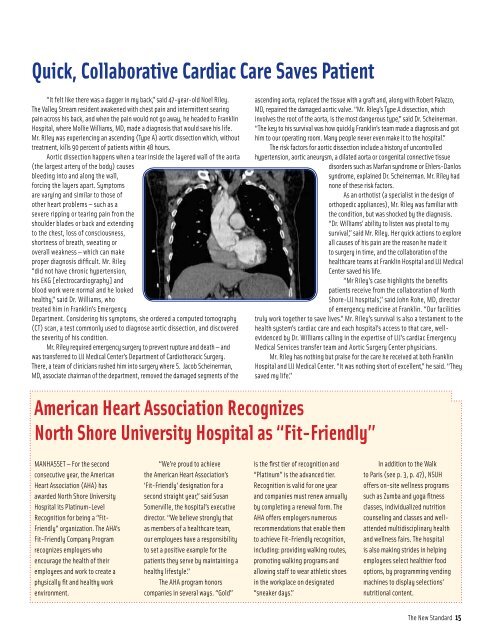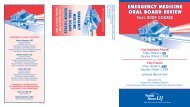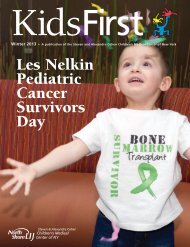Support for Soldiers and Veterans You Gotta Have Heart The Joy of ...
Support for Soldiers and Veterans You Gotta Have Heart The Joy of ...
Support for Soldiers and Veterans You Gotta Have Heart The Joy of ...
Create successful ePaper yourself
Turn your PDF publications into a flip-book with our unique Google optimized e-Paper software.
Quick, Collaborative Cardiac Care Saves Patient<br />
“It felt like there was a dagger in my back,” said 47-year-old Noel Riley.<br />
<strong>The</strong> Valley Stream resident awakened with chest pain <strong>and</strong> intermittent searing<br />
pain across his back, <strong>and</strong> when the pain would not go away, he headed to Franklin<br />
Hospital, where Mollie Williams, MD, made a diagnosis that would save his life.<br />
Mr. Riley was experiencing an ascending (Type A) aortic dissection which, without<br />
treatment, kills 90 percent <strong>of</strong> patients within 48 hours.<br />
Aortic dissection happens when a tear inside the layered wall <strong>of</strong> the aorta<br />
(the largest artery <strong>of</strong> the body) causes<br />
bleeding into <strong>and</strong> along the wall,<br />
<strong>for</strong>cing the layers apart. Symptoms<br />
are varying <strong>and</strong> similar to those <strong>of</strong><br />
other heart problems — such as a<br />
severe ripping or tearing pain from the<br />
shoulder blades or back <strong>and</strong> extending<br />
to the chest, loss <strong>of</strong> consciousness,<br />
shortness <strong>of</strong> breath, sweating or<br />
overall weakness — which can make<br />
proper diagnosis difficult. Mr. Riley<br />
“did not have chronic hypertension,<br />
his EKG [electrocardiography] <strong>and</strong><br />
blood work were normal <strong>and</strong> he looked<br />
healthy,” said Dr. Williams, who<br />
treated him in Franklin’s Emergency<br />
Department. Considering his symptoms, she ordered a computed tomography<br />
(CT) scan, a test commonly used to diagnose aortic dissection, <strong>and</strong> discovered<br />
the severity <strong>of</strong> his condition.<br />
Mr. Riley required emergency surgery to prevent rupture <strong>and</strong> death — <strong>and</strong><br />
was transferred to LIJ Medical Center’s Department <strong>of</strong> Cardiothoracic Surgery.<br />
<strong>The</strong>re, a team <strong>of</strong> clinicians rushed him into surgery where S. Jacob Scheinerman,<br />
MD, associate chairman <strong>of</strong> the department, removed the damaged segments <strong>of</strong> the<br />
MANHASSET — For the second<br />
consecutive year, the American<br />
<strong>Heart</strong> Association (AHA) has<br />
awarded North Shore University<br />
Hospital its Platinum-Level<br />
Recognition <strong>for</strong> being a “Fit-<br />
Friendly” organization. <strong>The</strong> AHA’s<br />
Fit-Friendly Company Program<br />
recognizes employers who<br />
encourage the health <strong>of</strong> their<br />
employees <strong>and</strong> work to create a<br />
physically fit <strong>and</strong> healthy work<br />
environment.<br />
“We’re proud to achieve<br />
the American <strong>Heart</strong> Association’s<br />
‘Fit-Friendly’ designation <strong>for</strong> a<br />
second straight year,” said Susan<br />
Somerville, the hospital’s executive<br />
director. “We believe strongly that<br />
as members <strong>of</strong> a healthcare team,<br />
our employees have a responsibility<br />
to set a positive example <strong>for</strong> the<br />
patients they serve by maintaining a<br />
healthy lifestyle.”<br />
<strong>The</strong> AHA program honors<br />
companies in several ways. “Gold”<br />
ascending aorta, replaced the tissue with a graft <strong>and</strong>, along with Robert Palazzo,<br />
MD, repaired the damaged aortic valve. “Mr. Riley’s Type A dissection, which<br />
involves the root <strong>of</strong> the aorta, is the most dangerous type,” said Dr. Scheinerman.<br />
“<strong>The</strong> key to his survival was how quickly Franklin’s team made a diagnosis <strong>and</strong> got<br />
him to our operating room. Many people never even make it to the hospital.”<br />
<strong>The</strong> risk factors <strong>for</strong> aortic dissection include a history <strong>of</strong> uncontrolled<br />
hypertension, aortic aneurysm, a dilated aorta or congenital connective tissue<br />
disorders such as Marfan syndrome or Ehlers-Danlos<br />
syndrome, explained Dr. Scheinerman. Mr. Riley had<br />
none <strong>of</strong> these risk factors.<br />
As an orthotist (a specialist in the design <strong>of</strong><br />
orthopedic appliances), Mr. Riley was familiar with<br />
the condition, but was shocked by the diagnosis.<br />
“Dr. Williams’ ability to listen was pivotal to my<br />
survival,” said Mr. Riley. Her quick actions to explore<br />
all causes <strong>of</strong> his pain are the reason he made it<br />
to surgery in time, <strong>and</strong> the collaboration <strong>of</strong> the<br />
healthcare teams at Franklin Hospital <strong>and</strong> LIJ Medical<br />
Center saved his life.<br />
“Mr Riley’s case highlights the benefits<br />
patients receive from the collaboration <strong>of</strong> North<br />
Shore-LIJ hospitals,” said John Rohe, MD, director<br />
<strong>of</strong> emergency medicine at Franklin. “Our facilities<br />
truly work together to save lives.” Mr. Riley’s survival is also a testament to the<br />
health system’s cardiac care <strong>and</strong> each hospital’s access to that care, wellevidenced<br />
by Dr. Williams calling in the expertise <strong>of</strong> LIJ’s cardiac Emergency<br />
Medical Services transfer team <strong>and</strong> Aortic Surgery Center physicians.<br />
Mr. Riley has nothing but praise <strong>for</strong> the care he received at both Franklin<br />
Hospital <strong>and</strong> LIJ Medical Center. “It was nothing short <strong>of</strong> excellent,” he said. “<strong>The</strong>y<br />
saved my life.”<br />
American <strong>Heart</strong> Association Recognizes<br />
North Shore University Hospital as “Fit-Friendly”<br />
is the first tier <strong>of</strong> recognition <strong>and</strong><br />
“Platinum” is the advanced tier.<br />
Recognition is valid <strong>for</strong> one year<br />
<strong>and</strong> companies must renew annually<br />
by completing a renewal <strong>for</strong>m. <strong>The</strong><br />
AHA <strong>of</strong>fers employers numerous<br />
recommendations that enable them<br />
to achieve Fit-Friendly recognition,<br />
including: providing walking routes,<br />
promoting walking programs <strong>and</strong><br />
allowing staff to wear athletic shoes<br />
in the workplace on designated<br />
“sneaker days.”<br />
In addition to the Walk<br />
to Paris (see p. 3, p. 47), NSUH<br />
<strong>of</strong>fers on-site wellness programs<br />
such as Zumba <strong>and</strong> yoga fitness<br />
classes, individualized nutrition<br />
counseling <strong>and</strong> classes <strong>and</strong> wellattended<br />
multidisciplinary health<br />
<strong>and</strong> wellness fairs. <strong>The</strong> hospital<br />
is also making strides in helping<br />
employees select healthier food<br />
options, by programming vending<br />
machines to display selections’<br />
nutritional content.<br />
<strong>The</strong> New St<strong>and</strong>ard 15




